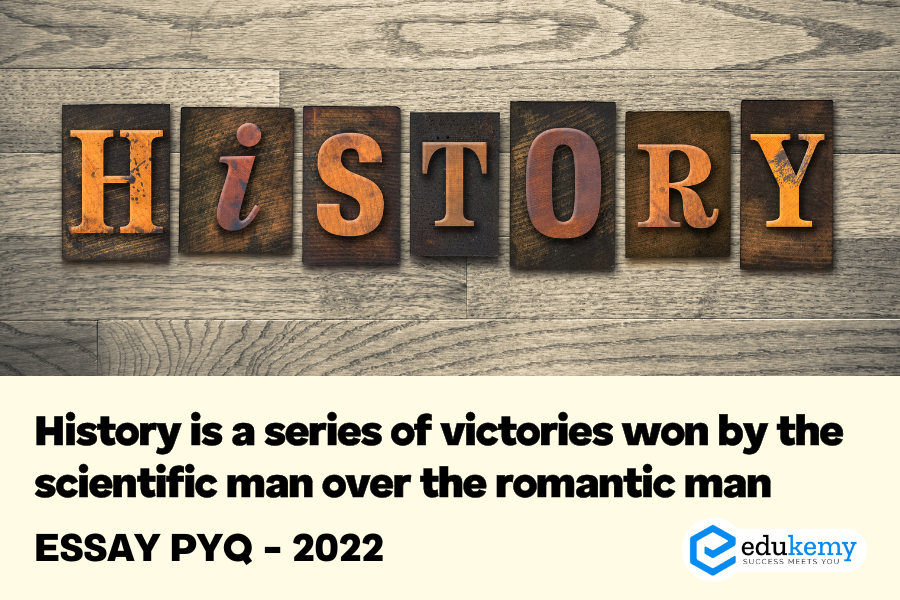Essay Previous Year Paper 2022- Click Here



The history of human civilization is a testament to the ongoing conflict between the rational, scientific mind and the intuitive, emotional one. However, it can be argued that there have been numerous instances throughout history where the scientific mindset has prevailed over the romantic mindset, leading to significant advancements in science, technology, and social progress.
This essay will explore this statement in detail about the romantic man and scientific man and their role in society. Then we will look into the triumph of scientific man over romantic man. We shall also try to understand why, in many cases, scientific man wins over romantic man and then we finally look into the role romantic man played in shaping our world and how their interplay could build a better understanding of our history.
Firstly, it is important to define what is meant by the terms “scientific man” and “romantic man.” The former refers to individuals who prioritize reason, logic, and empirical evidence over subjective feelings and beliefs. They value objective truth, rigorous experimentation, and the scientific method. The latter, on the other hand, prioritizes imagination, intuition, and subjective experiences over objective reality. They value emotion, beauty, and individuality. While both of these mindsets have their merits, it can be argued that history has seen a series of victories won by the scientific man over the romantic man.
One example of the triumph of the scientific mindset over the romantic mindset can be seen in the field of astronomy. In the past, many believed that the Earth was the center of the universe and that all celestial bodies revolved around it. However, through the work of scientists such as Galileo Galilei and Johannes Kepler, it was discovered that the Earth and other planets revolve around the sun. This discovery revolutionized our understanding of the universe and paved the way for further advancements in astronomy and space exploration.
Similarly, the Industrial Revolution was a time when the scientific mindset triumphed over the romantic mindset. The romantic mindset, with its focus on tradition and craftsmanship, was unable to keep up with the demands of the rapidly changing technological landscape. It was the scientific mindset, with its emphasis on innovation and experimentation, that paved the way for the modern world. From steam engines to electricity to the internet, scientific progress has transformed the way we live and work, and has created unprecedented economic growth and prosperity.
One of the significant victories won by the scientific mindset in India is in the field of agriculture. In the past, Indian agriculture was primarily based on traditional and folklore practices, with little scientific evidence to support their effectiveness. However, through the work of scientists such as M.S. Swaminathan, new agricultural techniques and technologies were developed, such as high-yield crops, hybrid seeds, and sustainable farming practices. These advancements in the scientific mindset have not only increased food production but also helped alleviate poverty and hunger in the country.
Another example in India can be seen in the field of healthcare. In the past, healthcare was largely based on traditional and folk remedies, and modern medicine was not easily accessible to the general population. However, through the work of scientists and medical professionals, modern medicine and healthcare facilities have been developed across the country. This has not only improved the quality of life for many Indians but has also helped to eradicate several diseases from the country.
Another area we look into would be the realm of politics. In the past, political decisions were often made based on emotion and personal beliefs rather than objective analysis. However, the scientific mindset has led to the development of political science as a field of study, which has enabled us to better understand how political systems work and how to improve them.
Through the use of data analysis, statistical modeling, and experimental design, political scientists have been able to identify the most effective policies and governance structures, and have helped to create more stable and successful political systems around the world.
Contents
- 1 Why does scientific man win over romantic man mostly?
- 2 Frequently Asked Questions (FAQs)
- 2.1 FAQ 1: Is the assertion that “history is a series of victories won by the scientific man over the romantic man” supported by historical evidence?
- 2.2 FAQ 2: How do scientific and romantic aspects contribute to historical developments?
- 2.3 FAQ 3: Can you provide examples that challenge the idea of a constant victory of the scientific man over the romantic man in history?
Why does scientific man win over romantic man mostly?
Advancements made by science and technology have allowed us to understand the world in a more objective, systematic, and rational way. This has led to the development of tools and techniques that have improved our lives in numerous ways. On the other hand, romanticism is often associated with emotion, intuition, and subjectivity. While these qualities are important and valuable, they are not always reliable when it comes to making decisions or solving problems that require concrete solutions.
In terms of historical examples, we can see how scientific advancements have led to significant victories, such as the development of vaccines and antibiotics that have saved countless lives, the ability to travel to space and explore the universe, and the invention of computers and the internet that have transformed the way we live and work.
The Constitution of India is a rational document that requires the government to govern the nation with a rational approach. The Indian constitution under Article 51A (H) encourages citizens to “develop a scientific temper, humanism, and the spirit of inquiry and change.” Hence, the Constitution is also promoting rationalism and scientism.
However, it would be a mistake to discount the role of romanticism in shaping our world. The Romantic movements, which emphasized the importance of emotion, imagination, and nature, played a crucial role in shaping art, literature, and culture. In India, the independence movement was driven in part by a romantic ideal of national identity and cultural pride. Similarly, the environmental movement, which emerged in the 20th century, has been driven by a romantic ideal of preserving nature and protecting the planet.
In India, for example, there have been many instances where artistic and romantic expressions have played a significant role in shaping history. Rabindranath Tagore, the famous poet, and writer, was an important figure in the Indian independence movement and was also awarded the Nobel Prize in Literature for his contributions to the field. His works emphasized the importance of cultural heritage and the need for India to assert its identity in the face of colonialism. Similarly, the Bhakti movement in India, which emerged in the medieval period, was a spiritual and artistic movement that rejected the rigid caste system and emphasized devotion and love for God. This movement had a profound impact on Indian society, leading to social and cultural changes that continue to influence Indian culture today.
Globally, the romantic movement of the 18th and 19th centuries was a reaction against the rationalism of the Enlightenment and emphasized emotions, individualism, and the beauty of nature. This movement gave rise to some of the greatest works of literature, art, and music. In history, including the works of William Wordsworth, John Keats, Ludwig van Beethoven, and many others.
While the progress of humanity has been driven in large part by scientific advances, it would be a mistake to discount the role of romanticism in shaping our world. Both scientific and romantic thought have played important roles in shaping our society, culture, and economy. A more nuanced understanding of the interplay between these two modes of thought is necessary to fully appreciate the complexity of human history.
Frequently Asked Questions (FAQs)
FAQ 1: Is the assertion that “history is a series of victories won by the scientific man over the romantic man” supported by historical evidence?
Answer: The assertion is a perspective rather than an objective historical fact. While certain historical developments can be attributed to scientific advancements, it is essential to recognize the multifaceted nature of history. History is shaped by a complex interplay of scientific, cultural, social, and political factors. The idea that one aspect, such as science, consistently triumphs over another, like romanticism, oversimplifies the dynamic and nuanced nature of historical progress.
FAQ 2: How do scientific and romantic aspects contribute to historical developments?
Answer: Both scientific and romantic elements have played significant roles in shaping history. Scientific advancements have led to technological progress, industrial revolutions, and medical breakthroughs, influencing the course of societies. On the other hand, romantic ideals, expressed through art, literature, and cultural movements, have contributed to the development of societal values, individual expression, and revolutions in thought. It’s crucial to appreciate the coexistence and interaction of these diverse elements in the historical narrative.
FAQ 3: Can you provide examples that challenge the idea of a constant victory of the scientific man over the romantic man in history?
Answer: Numerous historical examples challenge the notion of a consistent victory of science over romanticism. The Renaissance, for instance, was a period that witnessed both scientific advancements and a revival of classical art and literature, reflecting a harmonious coexistence of scientific and romantic pursuits. Additionally, movements like the Romantic Era in the 18th and 19th centuries saw a resurgence of appreciation for emotion, nature, and individualism, alongside ongoing scientific progress. These examples highlight the intertwined and complementary nature of scientific and romantic influences on historical developments.
In case you still have your doubts, contact us on 9811333901.
For UPSC Prelims Resources, Click here
For Daily Updates and Study Material:
Join our Telegram Channel – Edukemy for IAS
- 1. Learn through Videos – here
- 2. Be Exam Ready by Practicing Daily MCQs – here
- 3. Daily Newsletter – Get all your Current Affairs Covered – here
- 4. Mains Answer Writing Practice – here
Visit our YouTube Channel – here

